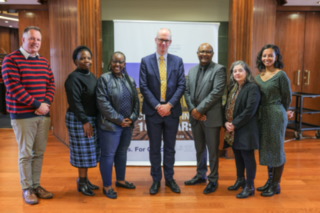
Rebecca McGuire-Snieckus
GALA Network and UNESCO Chair in Teacher Education for Diversity and Development Conference
Posted on April 19, 2023

Feature photo (left to right): Douglas Andrews, Thobeka Nkomo, Damaris Ngoru, Ian Gadd, Mucha Musemwa, Ruksana Osman and Nicole De Wet-Billings
A successful GALA Network and UNESCO Chair in Teacher Education for Diversity and Development Conference 2023 was held at the University of Witwatersrand. Following a warm introduction by the Assistant Dean for Research in the Faculty of Humanities, Professor Nicole De Wet-Billings, the Dean of Humanities, Professor Mucha Musemwa welcomed all delegates online and in person, highlighting the breadth of activity and collaboration across the Gala network. The GALA director, Professor Ian Gadd gave a brief overview of the GALA network before the UNESCO Chair in Teacher Education for Diversity and Development and Senior Deputy Vice-Chancellor Academic at the University of the Witwatersrand Professor Ruksana Osman delivered the inspiring keynote on the importance of academic work in addressing the UN Sustainable Development Goals. Presentations were a testament to the ambitions of the GALA network and what makes us distinctive as a diverse, faculty-led, broad in scope network with the Sustainable Development Goals as part of our strategy.
Dr Eri Mountbatten-O’Malley from Bath Spa University delivered a talk on Prospects for Global Flourishing Goals. Humankind stands at a crossroads today, confronted by environmental, social, and political challenges of existential proportions. Flourishing offers a robust response to these challenges. Flourishing is envisioned as the next step for human progress. It takes the vision of the SDGs, ESGs, IDGs and the Human Development Index forward and advances the global commitments of governments by providing a framework that not only makes societies richer/healthier/more sustainable/ more peaceful, but also strengthens the ties: between each of us as individuals; between the individual and the community; and between the individual and the planet. Flourishing as a human being is to live in a state of dignity. Flourishing is thus a state in which individuals contribute to the community, and in which communities foster and reinforce individual dignity. Flourishing involves taking a regenerative rather than an extractive approach to the environment. Flourishing is thus equally centred on the individual, and on the individual as the constituent element of community. Flourishing recognises that human progress requires more than provision of skills and knowledge; it requires new modes of learning and recognition of the impact that humans have on each other, the place and planet they inhabit. Flourishing enables individuals and communities to realise their own notion of the ‘good life’. This in turn would lead to enhancement of the collective good at every level and strata – from families, communities, workplaces, institutions, and States to the planet. In this paper it will be argued that Flourishing can become an ‘umbrella’ heuristic concept within which the best aspirations of the SDGs may be realised and, importantly, evaluated against. It can allow us to nurture a dynamic, adaptable, and ethical ‘civic culture’ founded on the GUARD core flourishing values framework of Goodness, Uniqueness, Agency, mutual Responsibility, and human Dignity.
Dr Abebe Belay Gebeyehu from Addis Ababa University presented on Strategies for improving the economic sustainability of farming communities and closing the inequality gap in Ethiopia’s Koga Irrigation and Watershed Project. In agriculture, economic sustainability is especially important. It is related to farmers’ primary economic goal. Household adaptation and mitigation measures, government reports, and policymakers all reflect the relative importance of economic goals for sustainability. However, communities lag behind what they can achieve in terms of economic sustainability, and there are even inequalities. These have been attributed to characteristics that are expected to vary from household to household and from community to community. Output and input-oriented measures of inefficiency loss show that communities lag far behind the optimal level of economic sustainability. The growth potential in each community appears to emphasize to improve efficiency rather than investing in new technologies and inputs for the greater economic sustainability of the Koga Irrigation and Watershed Project. Efficiency parameterization, convergence theory and scenario development were used to estimate the expected efficiency growth rate and years to close sustainability gaps. A farmer needs 9.42% growth in technical efficiency to achieve an optimum level of economic sustainability over ten years, and 15.46 years if a minimum reasonable growth rate of 6% per year is assumed. As a short-term plan, the economic sustainability inequality in the communities will be eliminated over a five-year period with a growth differential of 2.11% – 9.45%. Other communities simply need to grow faster in this range to close the sustainability gap with the most sustainable communities. Household size, frequency of consultation visits, male household head, share croppers mentality, and non-farm income are thought to facilitate convergence to the optimum level, while experience sharing towards a similar level of sustainability. The expected growth rate and years to close sustainability gaps were reasonable targets in the study area on various grounds. Therefore, local governments should consider convergence to the optimum level as a long-term strategy, as well as balanced community for short-term objectives.
Dr Caroline Kuhn from Bath Spa University spoke about Decolonising impact: building a research project from the ground up: the case of a Learning Hub for cheese making. The presentation will share the initial findings of a small exploratory study we made to investigate what are the barriers and enablers (cultural, material and social) for people (we are particularly interested in women and youth not in school) in the community of Kinangop, Kenya to engage in the co-creation of a learning hub to learn how to make and commercialise cheese and bread. In addition we also set up a knowledge exchange network with actors from the value chain for cheese in Kenya which will extend the learning hub’s coverage from cheese production to the entire cheese value chain. In our field work/exploration we aim to get to the level of structures and generative powers in people’s interaction with their social reality. For that we have designed our data collection based on Bhaskar’s (2016) ‘Four planar social being’ model to help us with understanding more in depth people’s social activity, their daily dynamics, their values, beliefs, cultural arrangements and all what can serve as potential constraints to engage in cheese making and commercialising. The findings will inform the co-design and development of a learning hub for the community as well as the design of an open educational resource to disseminate the knowledge (local and scientific) we gained in the process of making cheese and commercialising it so that other people that have not participated in the project can learn this skill and enhance their livelihood. The project aims to address SDG2 (Zero hunger: improve food security, promote sustainable agriculture, and improve nutrition), SDG4 (education), SDG5 (gender equality), SDG8 (decent work and economic growth), and SDG9 (Industry innovation and infrastructure)
Dr Sarah Earle from Bath Spa University delivered a talk on the subject of Supporting teacher confidence in primary science to enable relatable education for sustainability. Primary science lessons can provide an opportunity to explore sustainability with children, for example, through considering the interdependence of living things in the local environment or selection of recyclable materials fit for a particular purpose. However, many teachers lack confidence in science and as a result, may follow pre-written lesson plans that do not link to local and global issues. Supporting teachers to explicitly relate science lessons to the children in their class is a key part of building their ’science capital’, helping them to see that science is ‘for them’ (Archer et al. 2010; Nag Chowdhuri et al. 2022). Lessons that include an element of inquiry can support children to understand how science knowledge is developed and that the process can lead to new solutions in problem solving contexts. The Teacher Assessment in Primary Science (TAPS) Focused Assessment approach proposes a manageable way for teachers to approach science inquiry, with one focus selected at a time. This approach supports teacher confidence with knowing what they are looking for in a lesson, which means they can give ownership of other parts of the inquiry to the children, for example, decisions regarding which materials to test or how to record their results. The three-day Focus4TAPS professional learning program has been the subject of a large-scale Education Endowment Foundation (EEF) randomized control trial in England which found a statistically significant impact on pupil learning (Mujtaba et al. 2022). This paper will explore teacher survey data from the EEF evaluation, together with qualitative surveys completed by the course attendees during the program. We will consider how the TAPS resources can support education for sustainability (SDG 4.7) and teacher confidence in primary science, enabling them to teach inquiry lessons in a way that is inclusive and relatable for learners.
Dr Douglas Andrews from the University of Witwatersrand presented on The application of the Knotworking heuristic, as a theoretical tool, for teachers to address pedagogical responsiveness to learners with different learning needs in complex school systems. This presentation draws on findings from a qualitative study that investigated the use of Engeström’s (2015) Knotworking heuristic, as a specific type of collaborative approach to addressing constraints within different school systems. In this study, teachers collaborated with each other to share ideas in an attempt to improve their pedagogical responsiveness to students with different learning needs. The study was conducted in four different schools in South Africa and reports on data that was gathered from semi-structured interviews. In these interviews, the teachers reflected on their teaching experiences of diverse learners in the context of their unique and complex school systems, and on how collaborating with colleagues enabled them to address complex pedagogical challenges. Knotworking allowed teachers to come together in both structured and unstructured ways, to address the identified constraints. The participants were not the focus of the interactions, rather the identified issue was placed as the priority. The findings from the data show that active knotworking moments enabled relational engagement and agency for teachers, which enabled and empowered them to find better ways of being pedagogically response towards learners with different learning needs. The data also showed how knotworking gave teachers a mechanism through which they could effect change in their schools on a horizontal plane. References Engeström, Y. (2015). Learning by expanding: An activity–theoretical approach to developmental research (2nd ed.). Cambridge University Press.
Dr Elizabeth Walton from the University of Witwatersrand delivered a talk on Pedagogical responsiveness in complex contexts: Towards sustainable and transformative educational futures. Inclusive, quality education and lifelong learning for all is captured in Sustainable Development Goal 4. This is a laudable aim, but one that has proved elusive in a world characterised by inequality, conflict and exclusion. In the post-pandemic world, we find ourselves navigating new terrains, needing new and robust technologies and collaborations, reminded of the importance of the knowledge project, while responding to individual needs and circumstances. This presentation offers conceptual resources to support this navigation. Responsiveness and complexity have become familiar terms in pandemic times. When applied to education, they take on particular meanings separately and in combination. The first part of the presentation draws attention to the many factors that complexify education, including governance and policy, technology and artificial intelligence, student diversity and competing knowledge claims. We argue that these factors are agentic, and interrelate in networked but non-linear ways that can be understood as general (rather than restricted) complexity. The challenge is to remain pedagogically responsive to achieve quality, inclusive education within contexts that are complex. We describe characteristics and enablers of pedagogical responsiveness and then bring the ideas of complexity and pedagogical responsiveness into relation with each other. This shows that educational transformation becomes possible with optimal pedagogical responsiveness within a general view of complexity. In conclusion, we show how these ideas help to advance the possibility of more just and equitable educational futures and the realisation of SDG4, with cross-cutting impact on SDG1, 3, 5, 8, 10, and 16.
Associate Academic Director of the GALA network, Professor Rebecca McGuire-Snieckus provided the closing to the conference. The conference was one of two hosted by the Global Academy of Liberal Arts in 2023. The next one will be hosted by the Utrecht University on 21 April on Sustainable Liberal Arts.


Responses